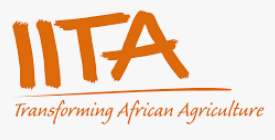... Linking agrobiz, sustainable environs, people & technology
The 2024 International Day of Plant Health is attracting shining light on the importance of leveraging innovation to protect plants by the Food and Agriculture Organization of the United Nations (FAO), reports NaijaAgroNet.
Search NaijaAgroNet
Showing posts with label International. Show all posts
Showing posts with label International. Show all posts
Sunday, May 12, 2024
FAO focuses on technology importance for IDPH - NaijaAgroNet
Labels:
2024,
Agriculture,
day,
FAO,
focuses,
Food,
health,
IDPH,
importance,
International,
NaijaAgroNet,
Nations,
organization,
plant,
Technology,
united
Thursday, August 17, 2023
Food security: Oyo to partner IITA - ITREALMS
NaijaAgroNet: ... Linking agrobiz, sustainable environs, people & technology
Oyo State governor, ‘Seyi Makinde, has expressed the readiness of his administration to collaborate with the International Institute of Tropical Agriculture (IITA) to ensure food security in the state.
Oyo State governor, ‘Seyi Makinde, has expressed the readiness of his administration to collaborate with the International Institute of Tropical Agriculture (IITA) to ensure food security in the state.
Saturday, May 9, 2015
Adopt Forest and Land-use policies to alleviate global hunger – IUFRO
International Union of Forest Research Organizations (IUFRO),
at a United Nations Forum on Forests in New York, called on countries with big
forest-dependent population to adopt national policies and land-use strategies
that support the planting of multi-functional trees to provide food, timber,
fuel wood, medicine and a host of environmental services that could access safe
nutritious food for all, NaijaAgroNet
reports.
The Union, NaijaAgroNet
gathered, estimates that some 805 million people – one in nine citizens of
Earth – are undernourished, primarily in Africa and Asia. At the same time,
between 1.2 and 1.5 billion people worldwide depend on forests for all or most
of their diet and livelihood.
Stepha Mcmullin, social scientist and member of the Union
report’s Authors, also concurred that forests and tree-based farming systems
such as agroforestry can complement agricultural production to ensure greater
food security and better nutrition for some of the world's most vulnerable
communities.
“If you're familiar with shade-grown coffee, then you have
an idea of what agroforestry is all about. By planting fruit trees and other
useful species, selectively weeding and otherwise managing the forests as
intensively as any farmer might tend their fields and rotate their crops;
people all over the world have created gardens that resemble natural forests in
many ways, including providing suitable habitat for a diverse array of flora
and fauna.” He said.
McMullin who, NaijaAgroNet
gathered, advocated that forests and tree-based systems also benefit people
indirectly, sited an instance in the Sahel region of Africa, noting that by
planting trees, poor farmers have turned millions of acres of what had become
semi-desert by the 1980s into more productive land, where trees now account for
80 per cent of average household incomes in the region, largely through
shea-nut production.
Coordinator of IUFRO’s Global Forest Expert Panels initiative,
Christoph Wildburger, told NaijaAgroNet
that tree-based farming can help prevent climate change calamities, which is
also a threat, not just to the productivity of agroforests but to conventional
agricultural operations, as well.
“Large-scale crop production is highly vulnerable to extreme
weather events, which may occur more frequently under climate change. Science
shows that tree-based farming can adapt far more better to such calamities. We
know that forest already play a key role in mitigating the effects of climate
change. It should also be made very clear that they also play a key role in
alleviating hunger and improving nutrition.” He said.
Ultimately, lack of community control over
forests and, of course, deforestation could limit the abilities of forests to
enhance food security. Forest management in most countries is fragmented across
different governmental agencies and administrative jurisdictions. Daniel Nsolibe /Ed, Ops.
... Linking agrobiz, sustainable environs, people & technology
Labels:
environmental,
Food,
Forest,
fuel,
International,
IUFRO,
medicine,
NaijaAgroNet,
national,
New York,
nutritious,
Organizations,
planting,
Research,
timber,
trees,
UN,
Union,
wood
Wednesday, May 6, 2015
UN - 34 African nation’s soil endangered
The United
Nations (UN) climate changes conference in Germany tagged “International Year
of Soils” has come to an end with scientist and environmental advocates
estimating that nearly a third of the world’s
soil is degraded, with the figure closer to two-thirds in sub-Saharan Africa, NaijaAgroNet reports.
NaijaAgroNet gathered
that the one week-long conference reports that 34 of Africa’s 54 countries have
over 20 percent in either the amount of land degraded or the amount of
population affected by land degradation.
Emphasizing
the importance of soil, NaijaAgroNet
gathered that the experts view the soil as one of the most important resources obtainable,
if not the most important. They further substantiate that it sustains all
our agricultural and livestock food production, wood for fuel production,
filters water so that we can drink it and fish can live in it, as well as useful
for construction – therefore sustaining our homes and infrastructure.
It further maintained as NaijaAgroNet learnt,
that in Africa, the issue of land
degradation (a decline in land quality caused by human activities) and
soil fertility decline is deeply complex with intertwining and cyclical
causes. These range from poverty, inadequate farming
techniques, and poor inherent soil qualities to population pressure, to
insecure land tenure and climate change, amongst other factors.
Stating
also that if these are issues are not addressed, the cycle of poor
land management will result in higher barriers to food security, agricultural
development for smallholder farmers and wider economic growth for Africa.
According
to Agriculture for Impact (A4I), an independent advocacy initiative, NaijaAgroNet gathered that the economic loss as a result of land degradation
is estimated at approximately N13.5 trillion ($68 billion) per annum.
It
further advocates that better land management practices could deliver
approximately N279 trillion ($1.4 trillion) globally in increased crop
production which is 35 times the losses.
NaijaAgroNet
also learnt that a 2008 report on the “Global Assessment of Land Degradation”
by the Food and Agricultural Organization (FAO) and partners offered some
shocking insights and surprises into the degree of soil degradation in
some African countries.
The
African countries on the UN watch list as NaijaAgroNet gathered would be the dry land African countries
around the Mediterranean and Middle East and relatively small areas in the
Maghreb and the Nile delta.
The
conference NaijaAgroNet
gathered, advocates that the rate of soil nutrient depletion is a factor that
must be considered when ranking which countries should be on the soil watch
list, as an important concern directly linked to food insecurity in
developing countries due to the intensification of land use for agricultural
production.
NaijaAgroNet gathered that 650
people from 80 countries gathered in Germany for the conference
that brought together scientists and environmental advocates to discuss
climate change’s increasingly hottest topic - soil.
Daniel
Nsolibe /Ed,Ops.
... Linking agrobiz, sustainable environs, people & technology
Subscribe to:
Comments (Atom)





